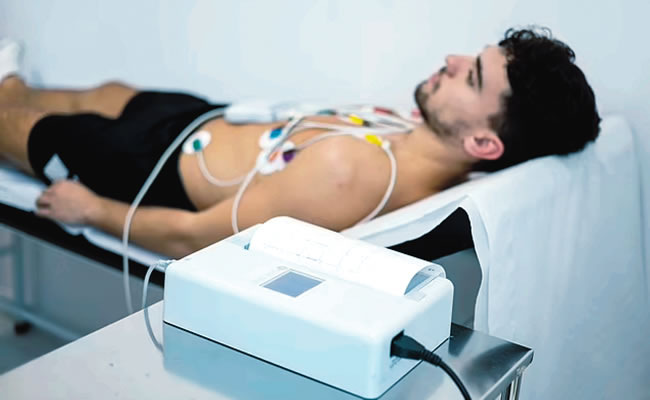Hundreds of Brits going into hospital could soon have the rough date they will die estimated by an AI death calculator.
Using the results of a single electrocardiogram (ECG) test — which takes minutes and records the electrical activity of the heart — it is able to detect hidden health issues that doctors might not be able to spot.
The programme, called AI-ECG risk estimation or AIRE, has proven in studies to correctly identify risk of death in the 10 years after the ECG, with up to 78 percent accuracy.

The tech will be trialed at two London NHS trusts from the middle of next year, but experts hope it will be used across the health service within five years.
Dr Arunashis Sau, a cardiology registrar at Imperial College Healthcare NHS Trust — one of the two trusts involved — said the aim of AIRE was not to develop something to replace doctors but to create something ‘superhuman’.
The tech ‘reads’ the ECG results to uncover patterns in the electrical signals and analyse genetic information from the heart’s structure to detect issues such as heart rhythm problems and heart failure before they fully develop.
It then gives a prediction figure, measured in years, of a patient’s risk level.

Dr Sau added: ‘The goal here is to try and use the ECG as a way to identify people that are at higher risk, who will then maybe benefit from other tests that could tell us more about what’s going on.
‘ECG is a very common and very cheap test, but that could then be used to guide more detailed testing that could then change how we manage patients and potentially reduce the risk of anything bad happening.
‘One key distinction is that the goal here was to do something that was superhuman.
‘So not replace or speed up something that a doctor could do, but to do something that a doctor cannot do from looking at heart tracing.
‘What we found is that AI could pick up things to do with the patient’s heart structure and function, and even things as deep as genetic information were being picked up.’
It is understood several hundred patients will be recruited for the first trial, which also involves Chelsea and Westminster Hospital NHS Foundation Trust, with numbers scaled up for future studies.
Research published today in the journal, Lancet Digital Health, found AIRE could also predict future heart failure — a condition in which the heart stops being able to pump efficiently, leading to a raft of health problems and an early death — in nearly eight in ten of cases.
In the study, the team trained the technology using a dataset of 1.16 million ECG test results from 189,539 patients.
They found it detected future serious heart rhythm problems in three quarters (76 percent) of cases, and future atherosclerotic cardiovascular disease — where the arteries narrow, making blood flow difficult — in seven in ten cases.
Dr Fu Siong Ng, a consultant cardiologist at Imperial College Healthcare NHS Trust said: ‘The vision is that every patient having an ECG in hospital will be put through the model.
‘Clinicians will then be informed, not just about what the diagnosis is, but a prediction of a whole range of health risks, which means that we can then intervene early and prevent disease.
‘There are some linked to weight, so you can put them through weight loss programmes.
‘You might even think about earlier medical treatments to prevent things from progressing, but that will be the subject of the clinical studies that we plan to do.’
It comes as alarming data earlier this year revealed that premature deaths from cardiovascular problems, such as heart attacks and strokes, had hit their highest level in more than a decade.
MailOnline has previously highlighted how the number of young people, under 40, in England being treated for heart attacks by the NHS is on the rise.
Cases of heart attacks, heart failure and strokes among the under-75s had tumbled since the 1960s thanks to plummeting smoking rates, advanced surgical techniques and breakthroughs such as stents and statins.
But now, rising obesity rates, and its catalogue of associated health problems such as high blood pressure and diabetes, are thought to be one of the major contributing factors.
Slow ambulance response times for category 2 calls in England — which includes suspected heart attacks and strokes — as well as long waits for tests and treatment have also been blamed.
Despite claims from anti-vaxxers, cardiologists say fears that Covid vaccines might have fuelled an increase in heart problems are way off the mark.
‘If, for example, it says you’re at high risk of a specific heart rhythm problem, you could be more aggressive in preventative treatment to prevent it from happening.
Culled from Daily Mail, UK
READ ALSO: Police debunk viral video on poor training conditions







